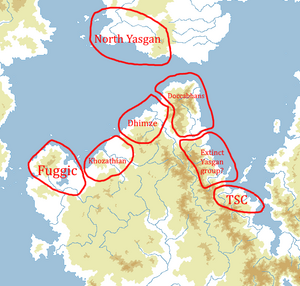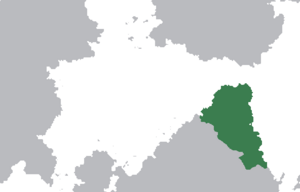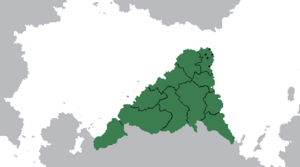Doccábh people: Difference between revisions
imported>Autumn No edit summary |
imported>Autumn |
||
| Line 21: | Line 21: | ||
Rulers were frequently referred to with the title ''áirrann'', literally meaning "forever-king". |
Rulers were frequently referred to with the title ''áirrann'', literally meaning "forever-king". |
||
| − | {|border="0" width= |
+ | {|border="0" width=900px class="wikitable sortable" |
! Birth |
! Birth |
||
! Reign |
! Reign |
||
Revision as of 11:49, 1 July 2022

The Doccábh (Classical Doccábh /do.ˈka:β/) were an ethnolinguistic and cultural group located in northern Yazland identified by their use of the Doccábhan languages, a branch of the Yasgan language family.
Prehistorical and Archaic periods
idk they like farmed or something
Aristocratic period
During the Aristocratic period, the land occupied by the Doccábhan tribes was ruled by many disparate kingdoms and city-states. Despite this, cultural unity was largely the case, though regional variation existed. Many of the smaller states were effectively ruled by nearby larger states.
Near the end of the Aristocratic period, one particularly large state, the SOMETHING, had come to control of a significant portion of the eastern land. A drought or something possibly along with the Khozathians made it so that they could just kinda sweep? Shit was bad after too it just like was under one monarchy trying to keep control of all the land (very good idea)
Regal period

After the instability of the Aristocratic period, something something one kingdom rules them all for like 400 years lmfao. This kingdom was, similarly, relatively unstable and fraught with civil war, especially towards the end of the kingdom's lifespan.
The regal period was marked by an increasing inclination towards more democratic reform. During this time period, however, the monarchy refused to give up the system of dynastic succession at any point, despite public outcry frequently being specifically about the powers the king held.
Rulers of the Regal period
Rulers were frequently referred to with the title áirrann, literally meaning "forever-king".
| Birth | Reign | Name | Notable information |
|---|---|---|---|
| c. 2165CY | c. 2196CY-2230CY | Fúigimi | Considered the founder of the Doccábhan state. |
| c. 2193CY | c. 2230CY-2249CY | Feicteág guerr Fúigimi | Son of Fúigimi. |
| c. 2214CY | c. 2250CY-2278CY | Gaideannoc eirr Fúgac aimmene, Feicteágac guerr |
Rule of the Quinquevirate


After the something, calls for democratic reform, end to monarchic rule, and relatively municipalist governance grew louder. In the end, five aristocratic families came forward to establish one of the first republics in the world.
Fall of the Quinquevirate
🦀the gay celts are dead🦀
Legacy
The Doccábhan Empire has a significant and varied legacy across the world, especially on the modern cultures found in Yazland, Etzavaz, and southern Ashnan. It had a long-lasting influence with large geographical reach and affected governance structures, law, cultural beliefs, technological advances, and language, and the effects of its presence can be deeply felt today.
Law
The Something legal system created the principles on which the law of many modern countries is based. Much legal terminology across the countries most influenced by the Doccábhan Empire comes directly from Classical Doccábh, and the general structure of jurisprudence is the same as used in the imperial period.
Modern democracy was pioneered by the system used during the Quinquevirate.
Language
loan words
Writing system
they did that too
other shit probably